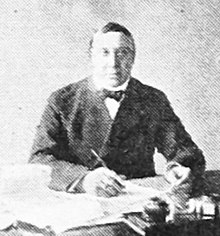Arthur G. Froe | |
|---|---|
 Portrait of Froe, published in The Crisis, November 1922. | |
| Recorder of Deeds for the District of Columbia | |
| In office 1922–1930 | |
| President | Warren G. Harding Calvin Coolidge Herbert Hoover |
| Preceded by | John F. Costello |
| Succeeded by | Jefferson S. Coage |
| Personal details | |
| Born | March 24, 1876 Abingdon, Virginia, U.S.[a] |
| Died | November 26, 1932 (aged 56) Welch, West Virginia, U.S. |
| Resting place | Blandford Cemetery, Petersburg, Virginia, U.S. |
| Political party | Republican |
| Spouse | Hattie C. Johnson Froe |
| Alma mater | Virginia Normal and Collegiate Institute Shaw University Howard University School of Law |
| Profession | Lawyer and politician |
Arthur Glenn Froe (March 24, 1876 – November 26, 1932) was an American lawyer and politician. He was appointed by President Warren G. Harding as the Recorder of Deeds for the District of Columbia, and served in this position from 1922 to 1930 during the presidential administrations of Harding, Calvin Coolidge, and Herbert Hoover.
Froe was born in Virginia in 1876, and attended Virginia Normal and Collegiate Institute. He served as a public schoolteacher before continuing his graduate studies at Shaw University and Howard University School of Law. In 1906, Froe relocated to Welch, West Virginia, where he established a law office, and later had a law firm with West Virginia House Delegate Harry J. Capehart and Leon P. Miller. Froe represented both African-American and white clients, including marginalized white ethnic groups.
Froe was active in West Virginia Republican Party politics. He served as a member of the board of education for McDowell County's Browns Creek school district from 1914 until 1919, and following the recommendation of West Virginia Governor John J. Cornwell, President Woodrow Wilson appointed Froe to a legal advisory board for McDowell County's draft boards during World War I. In 1921, Senator Davis Elkins and Congressperson Wells Goodykoontz, recommended Froe for the post Recorder of Deeds of the District of Columbia. President Harding announced Froe's appointment on February 1, 1922; the Senate confirmed him on February 15, and he took his oath of office on March 1. During his tenure, Froe sought support from Congress for higher salaries and increased office space for his agency. Froe served as recorder until his resignation in 1930. In September 1932, Senator Henry D. Hatfield named Froe as a member of the West Virginia Republican Party's advisory committee, aiding the party's campaigns ahead of the 1932 elections. Froe died in November 1932 following an extended illness.
- ^ "Death Record Detail: Arthur G. Froe". Charleston, West Virginia: West Virginia Archives and History, West Virginia Department of Arts, Culture and History. 2021. Archived from the original on December 6, 2021. Retrieved December 6, 2021.
- ^ "Arthur G. Froe, Lawyer, Passes". Bluefield Daily Telegraph. Bluefield, West Virginia. November 27, 1932. p. 4. Archived from the original on May 31, 2021. Retrieved May 31, 2021 – via Newspapers.com.
- ^ "Leaves Virginia Side Kin". Bluefield Daily Telegraph. Bluefield, West Virginia. December 2, 1932. p. 8. Archived from the original on December 8, 2021. Retrieved December 7, 2021 – via Newspapers.com.
- ^ "Correction". Bluefield Daily Telegraph. Bluefield, West Virginia. December 25, 1932. p. 7. Archived from the original on December 8, 2021. Retrieved December 7, 2021 – via Newspapers.com.
Cite error: There are <ref group=lower-alpha> tags or {{efn}} templates on this page, but the references will not show without a {{reflist|group=lower-alpha}} template or {{notelist}} template (see the help page).